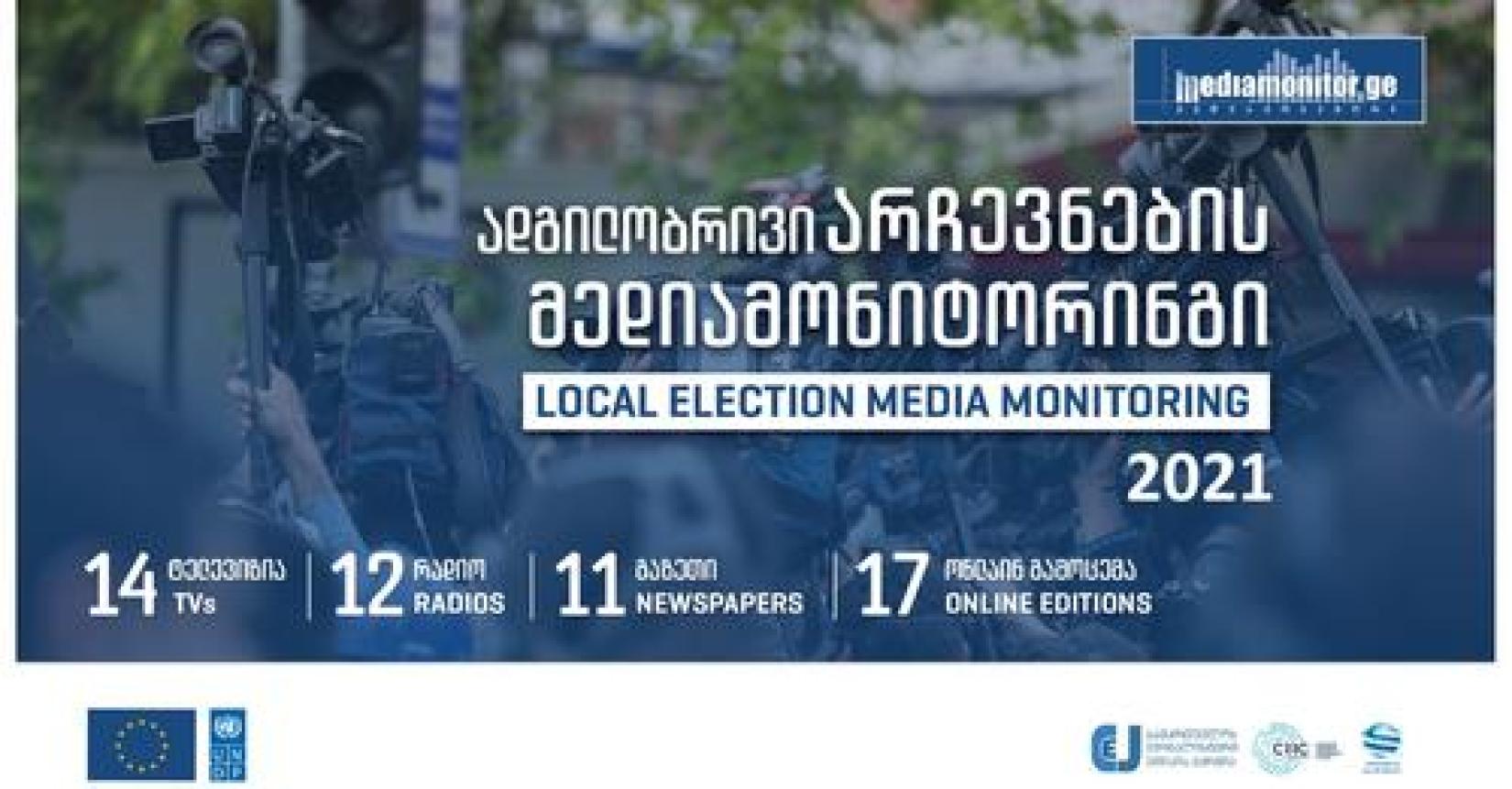EU and UNDP release pre-election media monitoring reports
30 September 2021
In the run-up to local elections, media research registers mounting tensions across all media sectors

Deep partisan divisions have defined the electoral media environment in Georgia throughout all recent elections. Findings of the media monitoring research, released today by the European Union (EU) and the United Nations Development Programme (UNDP), show that tensions between media camps have only increased between the parliamentary elections in 2020 and the local elections in 2021.
In the pre-election monitoring period (July through September 2021), polarization was pronounced across all sectors of the national and, to a lesser degree, regional and local media. Some of the media outlets, which were relatively balanced last year, are now showing clear signs of political preference.
Political divisions on television were most evident in July when homophobic pogroms and violent attacks on journalists dominated the media agenda. Although all national televisions closely followed the events, most of them manipulated their audiences by spreading political bias and negatively portraying political forces they did not favour. Facebook pages of the national televisions mirrored this trend by backing certain political forces and demeaning others.
Regional and local televisions were more focused on covering national news than local developments but failed to provide their audiences with high-quality information. News programmes were irregular and, in some cases, had to be suspended for several weeks for technical reasons.
Polarization and political bias have increased on national radios, a traditionally balanced and neutral media sector. Regional radios, though less biased in their reporting, did not provide critical analysis of the events and often used unverified information. Both national and regional radios tried to follow journalistic standards and refrained from discriminatory or abusive language.
As in previous years, unverified sources of information and offensive language remained an issue in national print media. In contrast to that, regional and local newspapers offered a relatively impartial account of events and a diversity of opinions.
The situation was different in the digital media sector. National publications were less polarized and more informative and balanced, while regional and local digital media outlets lent to political favouritism and used untrustworthy information sources. However, compared to television, political pressures and polarization were notably less evident across the entire digital media sector.
Compared to the 2020 electoral cycle, fewer cases of gender-discriminatory language were registered during the monitoring period across all media sectors.
The EU and UNDP media monitoring also studied how political players communicate with their constituencies on social media. The research focused on the contents of Facebook pages of political parties, politicians, mayors’ offices and public agencies, as well as open Facebook groups. Over 500 social media resources were monitored in total. Findings show that in the pre-election period, Facebook pages of the municipalities and mayors’ offices refrained from unethical political propaganda and electoral confrontations. Politicians and political parties used their Facebook pages to spread critical information about political opponents but, in most cases, stayed within the ethical frames of an election campaign. Although electoral news reached open Facebook groups and social media pages of the state agencies, their traction on these channels was relatively low.
As in 2020, the EU and UNDP commissioned specialised research on media coverage of the role of foreign actors in Georgian elections. In the pre-election monitoring period, the EU, Russian Federation (RF) and the United States of America (USA) were mentioned most frequently with the EU and the USA portrayed in a positive light across all media sectors. The media agenda was dominated by political developments, including a so-called ‘Charles Michel agreement,’ situation in Afghanistan and Georgia’s bilateral relations with Belarus and Ukraine. Depending on their editorial preferences, media outlets would either interpret these developments as examples of Georgia’s foreign policy success or, on the contrary, as proofs of the government’s anti-Western stance.
“The media landscape mirrors polarization in the Georgian society which becomes especially evident at a time of elections,” said Evija Kotan, Deputy Head of Political Section at the Delegation of the European Union to Georgia. “Media research serves as a critical tool for journalists, politicians and the public in fulfilling their civic duties during elections.”
“Voters place their trust in the media to make an informed choice at the ballot boxes,” said Anna Chernyshova, UNDP Deputy Head in Georgia. “The Georgian media can be praised for featuring a wide range of opinions and party options. However, political bias, unethical reporting and unverified sources of information remain a problem in many parts of the media.”
The EU-funded monitoring of media coverage of local elections in Georgia is implemented by UNDP in partnership with three Georgian civil society organizations: the Georgian Charter of Journalistic Ethics, Internews Georgia and CRRC-Georgia. This year, it covers 54 media outlets (27 national and 27 regional).
Media research will continue throughout the electoral cycle, covering an election campaign, election day and a post-election period (from July 2021 through March 2022). All reports are available on the website: mediamonitor.ge


